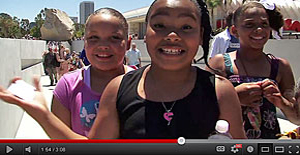Goodbye, car. Hello, CicLAvia.
April 7, 2011
 Bobby Gadda wants to take your bike.
Bobby Gadda wants to take your bike.
Don’t worry—you’ll get it back. But Los Angeles County’s top “bike valet” and his team will be keeping a close eye on it while you take a breather from Sunday’s CicLAvia—a 7.5 mile, 5-hour free-for-all along city streets usually clogged with cars.
Gadda’s a true believer in the concept; he traveled to Bogotá in 2009 to check out the original ciclovía, in which streets in the South American city are closed to cars every Sunday to allow bikes and pedestrians to roam freely. And he joined a small, pioneering group of other L.A. activists who took the idea and, well, rolled with it.
Los Angeles’ first CicLAvia in October drew tens of thousands of participants and was widely hailed as an instant, improbable hit in a town where automobile culture has long ruled the roadways.
“I was really nervous,” Gadda said. “I thought not enough people would show up. It was amazing. It was just so much fun, seeing all the people who are usually too timid to ride bikes out there.” Indeed, families and once-in-a-blue-moon cyclists made up a good chunk of the crowd.
Sunday’s repeat performance of the free event—from 10 a.m. to 3 p.m. on a route that stretches from East Hollywood to Boyle Heights—is intended to draw participants on bikes, skateboards, strollers and feet to experience Los Angeles in a totally unexpected way.
“It’s not just a bike ride. The idea is to get out there and enjoy the city,” Gadda said. “I’m really looking forward to all of the spontaneous, fun things that happen.”
There are food-related itineraries and historic building-spotting possibilities along the route. Some people have organized a dodge ball game. Others are planning a grapefruit harvest in Koreatown. A book club reading by L.A. Times architecture critic Christopher Hawthorne is set to meet on the 7th Street overpass above the 110 Freeway—along with other more impromptu happenings. “I’ve heard that people will be out there shooting each other with water guns. Last year, a marching band showed up,” said Gadda, who also remembered a giant papier-mâché bull being rolled out and painted by the crowd in October.
And, adding to the communal nature of the event, pop-up groups have organized to ride together along “feeder routes” from various points around town, including Culver City/Palms, Mar Vista, the Fairfax District, UCLA and the San Fernando Valley.
Gadda, who rolled the route last time on his “tall bike”—one frame welded atop another—said that taking away the cars also lowered the decibel level dramatically. “The most amazing thing for me the first time was just how quiet it was,” he said.
Of course, one person’s urban oasis can be another’s public transportation headache. Metro has announced a number of bus detours for affected lines; it also has a list of transit lines providing easy access to the event. (Details on both are here.)
Gadda, 26, who studied philosophy and biology at Reed College in Oregon, is originally from bicycle-friendly Portland. But he said he didn’t become “radicalized” on the subject of integrating bikes onto urban streets until he moved to L.A. three years ago and confronted the traffic here.
After working for a software company in Long Beach, he joined the staff of the Los Angeles County Bicycle Commission, where he now runs the organization’s bicycle valet program.
 On Sunday, Gadda, who’s also a member of CicLAvia’s board of directors, will be hauling out the program’s really long bike racks—large enough to accommodate 200 bicycles—and overseeing the bike valet team in Little Tokyo, outside the Japanese American National Museum.
On Sunday, Gadda, who’s also a member of CicLAvia’s board of directors, will be hauling out the program’s really long bike racks—large enough to accommodate 200 bicycles—and overseeing the bike valet team in Little Tokyo, outside the Japanese American National Museum.
The bike valet is a new addition this year, and may be expanded to other locations in future CicLAvia events.
The free service (there’ll be a tip jar out) will enable participants to drop off their bikes, grab lunch or check out the sights.
Another free service will be offered Sunday by a squadron of “bike angels”—mobile mechanics ready to help riders fix flats, replace chains or adjust seats on their bicycles.
Jason Neville, an urban planner with the city’s Community Redevelopment Agency, served as a “bike angel” at the first CicLAvia. He stuck a hand-crafted sign on his bicycle and hawked his services “kind of like a peanut vendor at Dodger Stadium—Free bike repair! Free bike repair!”
He said his “customers” responded to his efforts with “this sort of Angeleno surprise that someone was just being nice and helping.”
That wasn’t the only surprise. Neville said he was struck by how quickly bike riders could get across the notoriously spread-out and congested metropolis when automobile traffic was taken out of the equation. “MacArthur Park is a 20-minute bike ride from Boyle Heights,” Neville said. “Hollywood is a 10-minute bike ride from downtown.”
And like Gadda, he was impressed by the silence of the streets. “It was very peaceful,” he said. “It was a glimpse of what Los Angeles can be.”
Posted 4/7/11












 405 bridge work causes a stink
405 bridge work causes a stink

